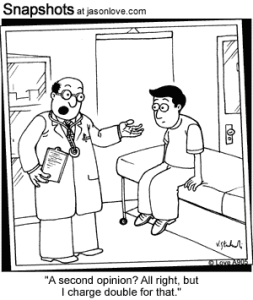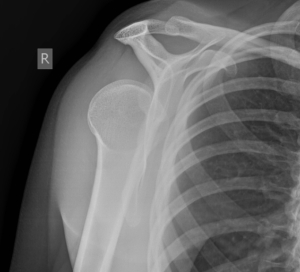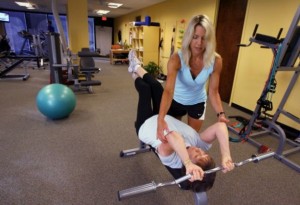
Run far and don't look back. -- Snapshots by Jasonlove.com
Last time around in my previous post I caught up a bit later than our normal weekly updates on my recovery from Open Bankart Shoulder Surgery on my right arm. I did that to show you the large amount of pivotal progress that is made in week five compared to previous weeks.
The latter part of week five into week six has been much the same. During my last PT session (12/2) my therapist began a more aggressive massage methodology on my scar tissue and shoulder blade. She advised me that what she was doing was flattening out and extending the scar tissue. This allows the scar tissue to become more flexible like normal muscle tissue, but still provide enough stabilization in the shoulder as to hold my bones in place. Only when really pressed on does the surgery scar even exhibit any noticeable pain. My humerus head is still sore, but not as bad as in the past. There is also still soreness around the shoulder blade and back muscles related to both non-usage, as well as, the strain being put on the muscles by my continued attempts to adjust my posture. My therapist stated left untouched the scar tissue would build into a large mounded mass and become too hard limiting range of motion. Worse yet it would also stick to the other muscles and soft tissue limiting their movement as well. All in all, the importance of continued massaging of the surgery scar by a PT is important at this point as internally there is still late stage healing going on.
We then did some light stretching and shoulder blade rotations. Then came the grueling part. We began slowly with the therapist and an assistant’s help moving my arm upward above my head (as if I was reaching upward except I was really laying flat on my back). The first time we measured 142 degrees, which is two degrees up from last session earlier this week (see previous entry link above). Again, to recap, 180 degrees is the maximum measurement for an upward reach and my ultimate goal. 142 degrees came with minor discomfort and is my “pain limit”. The next two upward reaches went beyond my pain limit. First to 145 (where intense pain set in) and then beyond to what was my true flexibility reach (where muscles in my arm tightened rigid with no more ability to stretch from shoulder to wrist– it sounds as horrible as it really is but is actually less pain than the intense pain threshold where the shoulder joint has to slide into one another at the collar bone and humerus). My final reach at true flexible limits of motion was 150 degrees. This is ahead of schedule and a good sign. My goal is over the next session to reach that 150 deg. limit without the intense pain point occurring and to continue to limber up the collar bone to humerus joint that is limiting my existing reach with pain.

This is what I saw in the ER basically... yeah. Posterior Shoulder Dislocation - Courtsey of http://lifeinthefastlane.com
To do that, my therapist and I discussed adding another exercise for at home PT– a wall climb. The wall climb is done in the shower after heating the arm with warm water (to encourage flexibility and blood flow). You stand facing a flat wall. Reach out with your arm extended to touch the wall with your finger tips “spider” style on the wall. You then walk the “spider” up the wall at the same time you slowly move towards the wall itself. The result is your hand slowly climbs the wall and is supported by it. Once at the apex of the wall you hold it for fifteen seconds. Then walk back down while stepping away from the wall. This is done three times and should encourage the motion limit to lift over the coming weeks.
Other than that we then did ice and electric stimulation to ease both swelling and pain from the session.
Six weeks marks the end of high risk of dislocation and infection. There are still minor risks of both over the last six weeks, but you can finally go into public without a sling. You still need the sling when you sleep though. Six weeks marks the point where some normality returns to your life and you can look back to see the large amount of progress made over the course of the prior weeks. It did feel like an incredibly long time, but now at least there is the encouragement of knowing something is really happening and you really are starting to feel better.
The biggest thing is now that you start feeling better to not get lazy. You need to still get PT, still do your at home exercises, and still need to keep in mind your arm is not 100% (realistically it’s about 50% at this point or a bit lower). This insures you continue to heal and make progress.
Next week I return to work and I’ll be switching to document how that interacts with PT and exercises. I had to get a note from my orthopedic surgeon during my five week post-op visit saying I could come back. I then handed that back into HR and they’ll file the closing of my disability claim with NYS when I return on 12/7/09. I already discussed with my direct supervisor and my HR manager my “special needs” such as PT sessions and a 20 minute “exercise break”. I’m swapping out lunch and a fifteenth minute break then making up whatever time I go over on by staying longer. This was all approved without issue (your employer will just be glad to have you back). I do have a 10 lb. lifting limit on my work, but other than that because most of my work is clerical and managerial in nature I can do my normal workload.
If you do physical labor you may not be able to return to work at this point, but that is between you and your surgeon to determine. After 12 weeks most people can return to most jobs, but again– cases vary and you need to consult your medical professional about that, as well as, work out arrangements with your employer (including FMLA and disability where needed).




